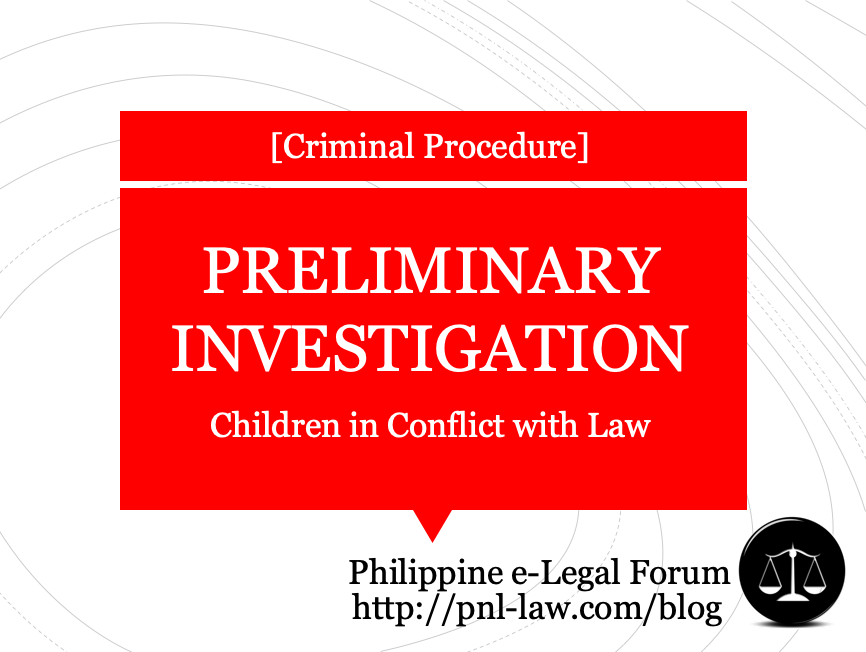A criminal action may be instituted against a child in conflict with the law by filing a complaint with the public prosecutor. Preliminary investigation shall be conducted in the following instances:

- (a) when the child in conflict with the law does not qualify for diversion;
- (b) when the child, the parents or guardian do not agree to diversion; or
- (c) when, after considering the assessment and recommendation of the social worker, the prosecutor determines that diversion is not appropriate for the child in conflict with the law.
Because diversion is also proper before the conduct of a preliminary investigation, such preliminary investigation may only be conducted, in all instances, if there is a certification from the Barangay, police or local social welfare and development officer, as the case may be, that: (a) the child does not qualify for diversion; or (b) diversion is not appropriate; or (c) the diversion failed at their level.
[See also Primer on the 2019 Supreme Court Revised Rule on Children in Conflict with the Law]
HOW PRELIMINARY INVESTIGATION IS CONDUCTED
As far as consistent with this Rule, the preliminary investigation of a child in conflict with the law shall be governed by Section 3 of Rule 112 of the Revised Rules of Criminal Procedure. A specially trained prosecutor shall be assigned to conduct the inquest, preliminary investigation and prosecution of the case involving a child in conflict with the law.
The child shall be assisted by a private lawyer or, if none, a lawyer from the Public Attorney’s Office. If there is an allegation or evidence of torture or ill-treatment of a child in conflict with the law during custody or detention, it shall be the duty of the prosecutor to investigate the same.
Upon serving the subpoena and the affidavit of complaint, the prosecutor shall notify the Public Attorney’s Office of such service, as well as the personal information, and the name and address of the guardian of the child in conflict with the law.
At the preliminary investigation, should there arise a need for clarificatory questions to be propounded on the child, the Rule on Examination of a Child Witness shall apply.
FILING OF INFORMATION
The investigating prosecutor shall prepare the Resolution and corresponding Information, for the approval by the provincial or city prosecutor, when:
- 1. He/she finds probable cause to hold the child in conflict with the law for trial;
- 2. There being discernment; AND
- 3. He/she certifies that: (a) the child does not qualify for diversion; or (b) diversion is not appropriate; or (c) the diversion failed at their level.
The child and the mother or father, or guardian, or in the absence thereof, the nearest relative, and the child’s private counsel or lawyer from the Public Attorney’s Office shall be furnished with a copy of the approved Resolution and the Information.
The Information shall be filed with the court within 45 days from the start of the preliminary investigation and must allege that the child acted with discernment.
WHEN INFORMATION MAY NOT BE FILED
No Information shall be filed against a child for the commission of the following:
- (a) status offenses (e.g., curfew violations, truancy, parental disobedience, anti-smoking and anti-drinking laws), light offenses and misdemeanors against public order or safety (e.g., , disorderly conduct, public scandal, harassment, drunkenness, public intoxication, criminal nuisance, vandalism, gambling, mendicancy, littering, public urination and trespassing);
- (b) vagrancy and prostitution under Section 202 of the Revised Penal Code;
- (c) mendicancy under Presidential Decree No. 1563; and
- (d) sniffing of rugby under Presidential Decree No. 1619.
Children taken into custody for the foregoing shall instead undergo appropriate counseling and treatment program.
VENUE OF CASE
Any criminal or civil action involving a child in conflict with the law shall be instituted and tried in the appropriate court nearest the place where the offense was committed or where any of its essential elements occurred.
[See also Conduct of Trial for Children in Conflict with the Law and 2019 Supreme Court Revised Rule on Children in Conflict with the Law]
